The Best Salt For Baking Recipes
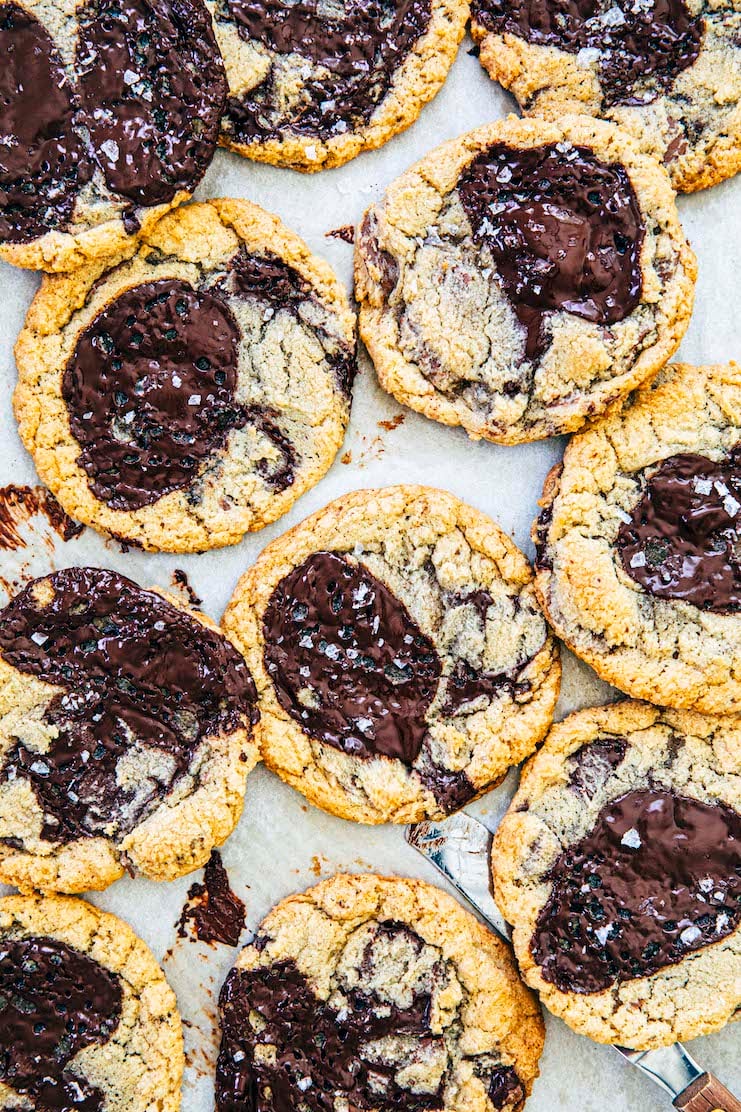
What Is The Best Salt For Baking Recipes?
Most baking recipes typically use either one of these salts: table salt, kosher salt, or sea salt. While all three types will work in most baking recipes, it’s best to use the specific one that the recipe recommends. And if the recipe doesn’t specify, I recommend using table salt or kosher salt. But my personal preference is to use kosher salt for my baking recipes.
Here’s a quick primer on the different kinds of salt:
Table Salt Versus Kosher Salt Versus Sea Salt
Here are the differences between the different kinds of salt:
- Table Salt: If you see a recipe that simply states “salt”, it usually refers to table salt (also known as “standard grain salt”). This is the most common type of salt you’ll find. It is finely processed and has the texture and consistency of granulated white sugar.
- Kosher Salt: Kosher salt has larger, coarser crystals than table salt. This type of salt was originally designed for salting meat, with larger granules that are easier to wash off. Most kosher salt is also non-iodized (learn more in the next section), which makes it neutral in flavor and ideal for recipes. Popular brands of kosher salt include Diamond Crystal kosher salt and Morton kosher salt.
- Sea Salt: Sea salt is a catch-all term for any salt harvested from salt water. Beyond that, there’s no consistent definition as to what “sea salt” actually means. That means sea salt can be different sizes, colors, and shapes. Because of this, I suggest avoiding sea salt and just sticking to either table or kosher salt for consistent results.
Iodized Versus Non-Iodized Salt
Iodized salt is salt that has been treated with potassium iodide or iodine for dietary purposes. This can give iodized salt a slight chemical taste.
For baking recipes, use a non-iodized salt. That way, you won’t get any chemical tastes in your baked goods! But don’t panic if iodized salt is all you have—if you’re only using a small amount (think: ¼ teaspoon or less) or baking a recipe with strong flavors, you probably won’t notice its taste.
What About Flaky Sea Salt?
These are large, crunchy salt flakes that are typically used for sprinkling (or “finishing”) savory and sweet dishes. A popular brand of flaky sea salt is Maldon Sea Salt Flakes.
Unless you’re using it as a sprinkling/finishing garnish, I don’t recommend using flaky sea salt in baking recipes. Why? The large flakes don’t dissolve or disperse evenly in doughs and batters, leaving crunchy, salty pockets in whatever you’re baking.
That being said, I love using flaky salt as a garnish to many of my recipes. Check out some of my favorites below!
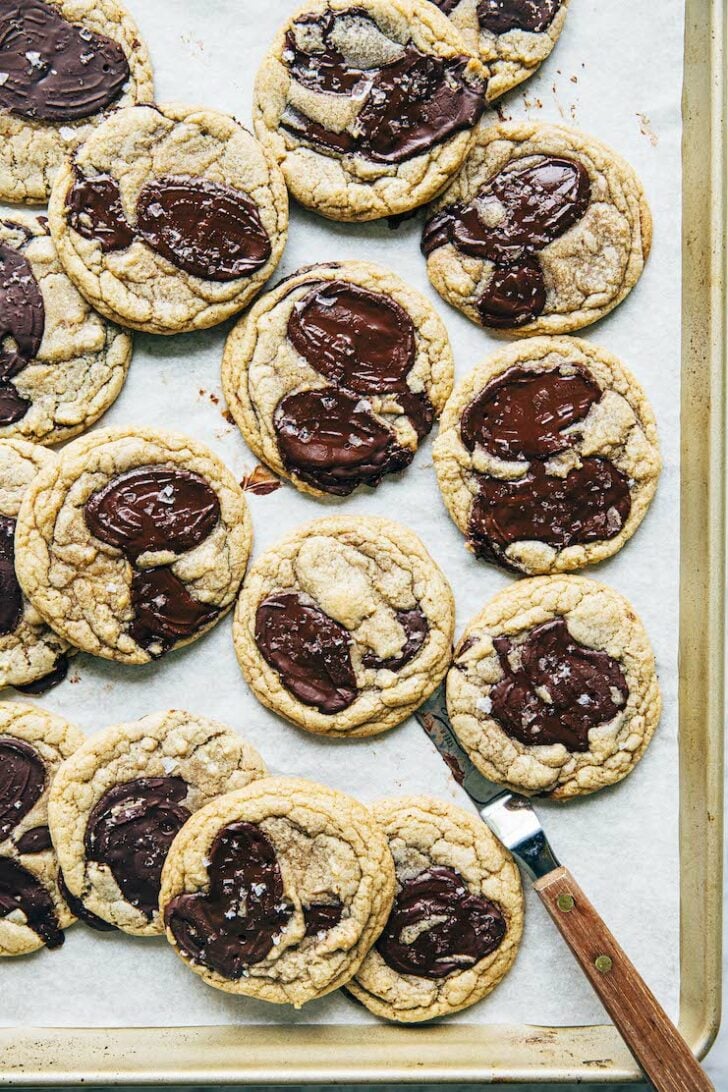
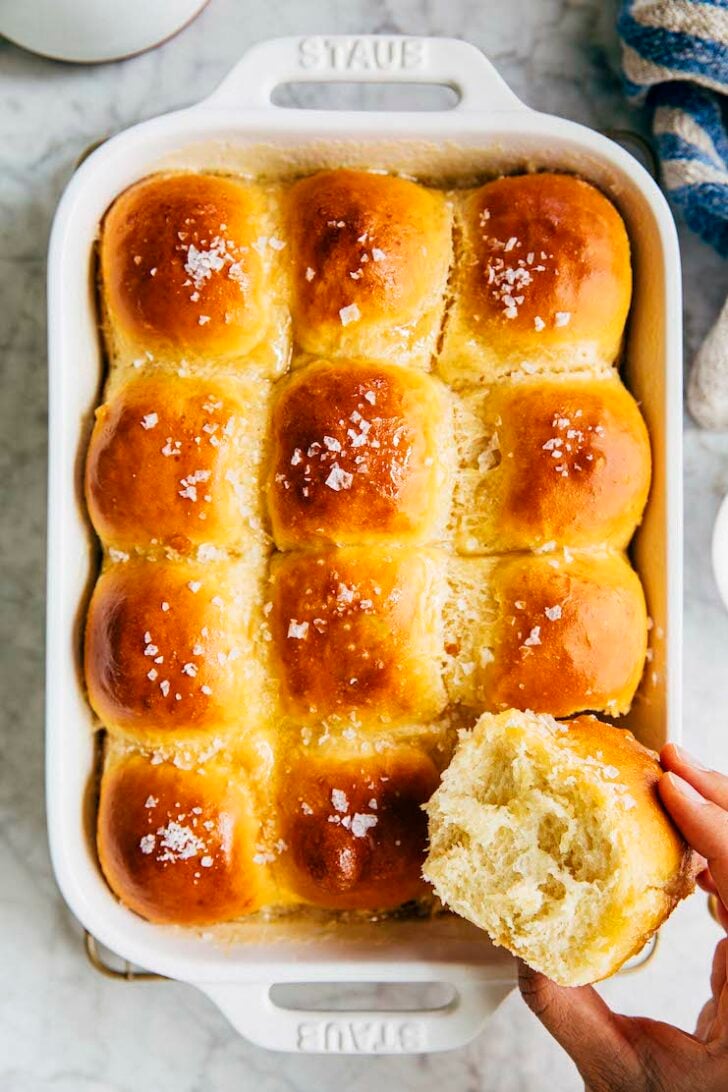
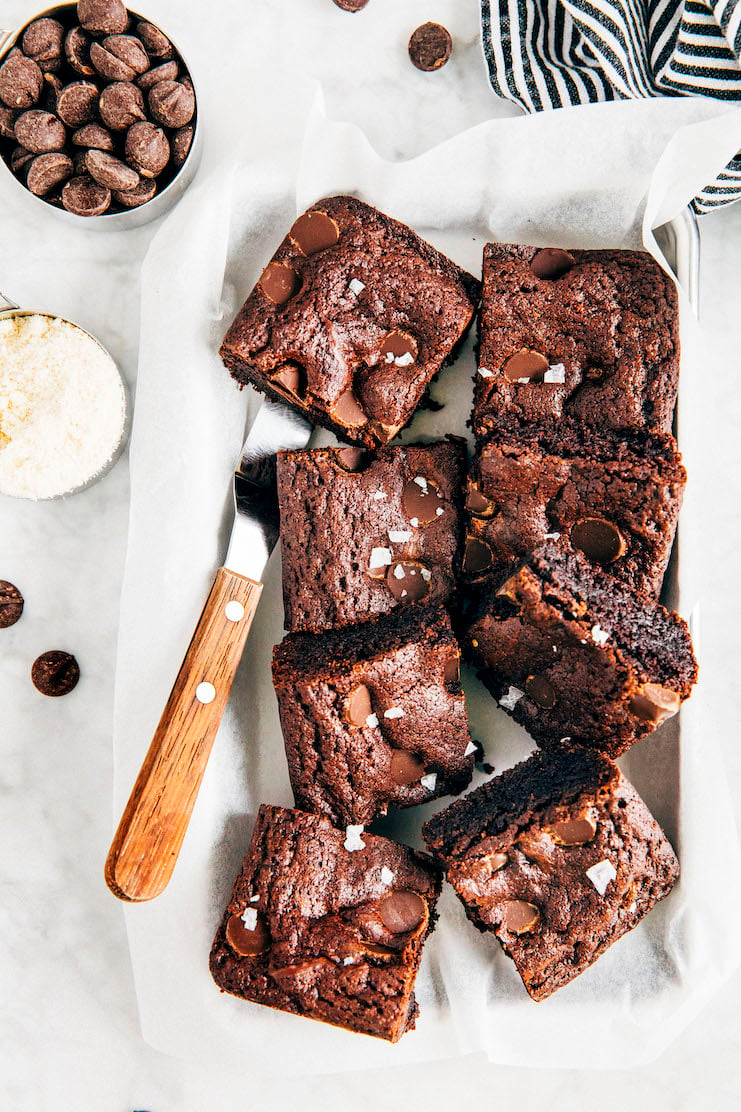
Featured Recipes:
- My Best Easy Chocolate Chip Cookie Recipe
- Salted Honey Parker House Rolls
- Small Batch Almond Flour Brownies
Why I Think Kosher Salt Is The Best Salt For Baking Recipes
I like to use kosher salt in my baking recipes for these reasons:
- Kosher salt tastes “better”. I mentioned earlier that kosher salt is typically NOT iodized. That means most kosher salts don’t have a chemical taste, and instead taste neutral and clean.
- Kosher salt granules are larger. That means it’s difficult to confuse with granulated sugar (which I once did when I was using table salt and rushing through a recipe—yikes!). These larger granules also mean that the salt dissolves more slowly in batters and doughs, allowing for a more even distribution of salt.
Note that NOT ALL KOSHER SALTS ARE CREATED EQUAL. The two major brands—Diamond Crystal and Morton—are processed differently, leading to different sized salt granules and flavors. Learn more in the next section!
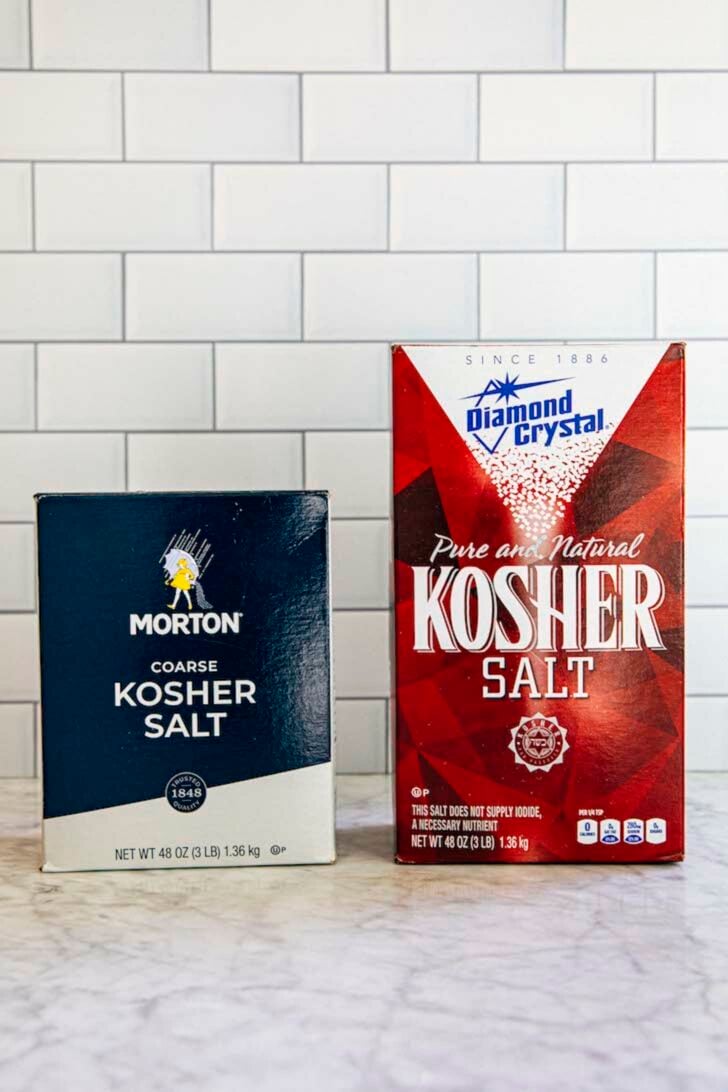
Diamond Crystal Versus Morton Kosher Salt
Without getting too scientific, here are the main differences between Diamond Crystal and Morton kosher salt:
- The two salts are made differently. Diamond Crystal is crystallized in an open container of brine, yielding light and hollow flakes. Morton is made by rolling cubic crystals of vacuum-evaporated salt into dense flakes. You can learn more about the specifics in Samin Nosrat’s best-selling book, Salt Fat Acid Heat.
- These processing differences lead to differences in flavor. A tablespoon of Diamond Crystal kosher salt will taste less salty than a tablespoon of Morton kosher salt (which will taste saltier).
- As well as different sizes and texture, too. America’s Test Kitchen and Cook’s Illustrated examined the two salts under a microscope. You can really see their differences! Diamond Crystal kosher salt has smaller, crumblier granules that look like clear diamonds. Morton kosher salt look like larger, flatter pebbles that look like opaque gemstones.
- These different textures and sizes mean they melt differently in recipes. Because Diamond Crystal has smaller, crumblier granules, it melts more quickly than Morton kosher salt.
And because of its crystal shape, the granules don’t sit as snug against each other, leading to a lighter and less salty flavor. This means that 1 Tablespoon of Diamond Crystal will taste LESS salty than 1 Tablespoon of Morton kosher salt. You’ll need to use more Diamond Crystal to get the same flavor.
While that sounds like a bad thing, it’s not! This quality makes Diamond Crystal more forgiving in the kitchen. Why? You’re less likely to oversalt your food if you use Diamond Crystal kosher salt.
Why Many Professionals Use Only One Kosher Salt Brand (And It’s Usually Diamond Crystal Kosher Salt)
Because of these differences, many professional chefs, bakers, and recipe developers stick to one brand over the other. And many of them prefer Diamond Crystal kosher salt to Morton kosher salt. Including me! I developed all recipes on Hummingbird High with Diamond Crystal kosher salt.
So if you see a recipe that DOES NOT SPECIFY which brand to use, you can safely assume that the recipe developer used Diamond Crystal kosher salt. And because of this preference, I suggest stocking up on Diamond Crystal kosher salt in your kitchen.
I can’t find Diamond Crystal kosher salt. Can I use Morton kosher salt instead?
Yes, you can use Morton kosher salt instead of Diamond Crystal. But you’ll need to adjust how much to use. A good rule of thumb is to use half the amount of Morton kosher salt in a recipe that uses Diamond Crystal kosher salt.
For instance:
- If a recipe instructs you to use 2 teaspoons of Diamond Crystal kosher salt, you can use 1 teaspoon of Morton kosher salt instead.
- If a recipe instructs you to use 1 teaspoon of Diamond Crystal kosher salt, you can use ½ teaspoon of Morton kosher salt instead.
It also works the other way. So if a recipe instructs you to use 1 teaspoon of Morton kosher salt, you can use 2 teaspoons of Diamond Crystal kosher salt instead.
And on that note:
SALTS ARE NOT INTERCHANGEABLE—Here’s How To Substitute Different Salts In Baking Recipes
Whew, you made it this far. Here’s my TL/DR of everything you’ve learned and how you can apply it to your kitchen:
- If you see a recipe that just says “salt”, it’s safe to assume that the recipe means table salt.
- If you see a recipe that just says “kosher salt”, it’s better to assume that the recipe developer used Diamond Crystal kosher salt.
- The recipe calls for kosher salt and you only have table salt. No problem! Use half the amount listed in the recipe. For instance—if a recipe uses 1 teaspoon of kosher salt, use ½ teaspoon table salt instead.
- This also works the other way. That is, if a recipe instructs you to use ½ teaspoon table salt, you can use kosher salt instead. BUT the amount will depend on what kind of kosher salt you have.
If you have Morton kosher salt, you can use the same amount of table salt (in our example, you’ll need ½ teaspoon Morton kosher salt as a substitute for the ½ teaspoon table salt). If you have Diamond Crystal kosher salt, you’ll need to use 1 teaspoon of Diamond Crystal kosher salt as a substitute for the ½ teaspoon table salt. - The recipe calls for Diamond Crystal kosher salt and you only have Morton kosher salt. No problem! Use half the amount listed in the recipe. For instance—if a recipe uses 1 teaspoon Diamond Crystal kosher salt, use use ½ teaspoon Morton kosher salt instead.
- This also works the other way. The recipe calls for 1 teaspoon Morton kosher salt and you only have Diamond Crystal. Use 2 teaspoons Diamond Crystal instead.
Learn More Baking Tips, Tricks, and Techniques
If you liked this kind of nerdy baking science post, I’ve got even more Baking Tips:
- The Best Chocolate For Chocolate Chip Cookies
- The Best Buttermilk Substitutes In Baking Recipes
- The Best Brownie Box Mix
And definitely check out my cookbook, Weeknight Baking, for even more cool baking tips, tricks, and techniques!


